SoTW is a non-commercial venture, intended solely to promote the appreciation of good music. Please show your support by signing up here for a single weekly notification.
It seems our Joni is the Lady of the Hour, so I’m going to share with you the whole shaggydog tale of how I encountered her, how I fell in love with her, and how I broke her heart. Okay, hurt her feelings. A little bit. Maybe. Or not. Whatever.
First Flowers in a Fertile Field
Rebellious young Joni Anderson left Saskatoon, Saskatchewan at 21 for Toronto, to become a folk singer. She got pregnant, gave the baby away for adoption, married a folk singer named Chuck Mitchell, and began playing around Detroit and the East Coast. A prolific songwriter even then, a number of her songs were picked up in 1967 by well-known folkies – Tom Rush (‘Urge for Going’), Judy Collins (‘Both Sides Now’, ‘Michael from Mountains’, ‘Chelsea Morning’), Buffy Saint-Marie (‘The Circle Game’), Fairport Convention (‘Eastern Rain’). In early 1967 her marriage dissolved, and she moved by herself to New York City. David Crosby, recently expelled from The Byrds for overall weirdness, heard her singing in a club in Coconut Grove,Florida, and convinced lean and hungry Reprise Records to let him produce her in an acoustic album.
 Joni Mitchell, ‘Urge for Going’, CBC, 1966
Joni Mitchell, ‘Urge for Going’, CBC, 1966
Joni Mitchell, ‘Eastern Rain’, England, 1967
What was brand new when her album was released? “The Notorious Byrd Brothers”, “The Graduate” soundtrack, the first Blood, Sweat & Tears, Otis Redding’s “Dock of the Bay”, Vanilla Fudge’s “The Beat Goes On”, the Mothers of Invention’s “We’re Only In it For the Money”, Dylan’s “John Wesley Harding”, Traffic’s “Mr Fantasy”, The Stones’ “Their Satanic Majesties’ Request”, Laura Nyro’s “Eli and the 13th Confession”, Leonard Cohen’s first album.
Crosby, Stills and Mitchell
What excited me when I first saw “Song to a Seagull” on the shelf? Not the mother-earth hippie queen look (Judy Collins had already ruined that niche), not the music (I’d vaguely heard of ‘Urge for Going’, and Judy Collins’ ‘Both Sides Now’ was cloyingly diabetes-inducing). It was the small print on the back of the album, Produced by David Crosby, Bass by Stephen Stills (the driving force behind the still-extant Buffalo Springfield). The best member of The Byrds collaborating with the best member of Buffalo Springfield? Both with a melodic, acoustic bent? Wow, that could be a really fruitful partnership. This was months before I read a blurb in Rolling Stone that the two of them were hanging out with an ex-Hollie, thinking of forming a new group. Of course, CS&N, together with Joni Mitchell, would soon form the core of a Laurel Canyon social and sexual circle which would produce some of the best music in the last half century.
Joni Mitchell & Johnny Cash, ‘Long Black Veil’ (“The Johnny Cash Show”)
Joni Mitchell, ‘Both Sides Now’ (Johnny Cash Show)
The Day I Broke Joni’s Heart
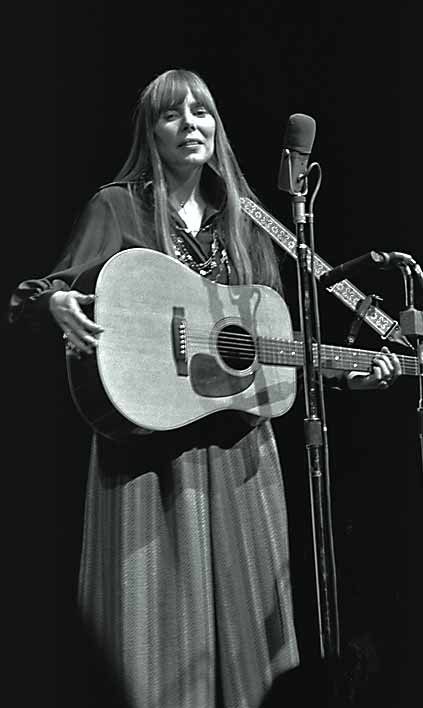 I met Joni Mitchell once, for a brief moment—in Nashville, outside the Grand Ole Opry, on May 1, 1969, where I had driven with my friend and photographer (now author) Rod Pennington to see Bob Dylan make his first announced appearance in two full years, on The Johnny Cash Show. It felt like were the only two long-hairs in the entire Confederacy. We were hanging around the artists’ entrance when Joni drove up. I was virtually the only person in Tennessee who had ever heard of Dylan, let alone Joni Mitchell. I was chatting with her when Dylan Himself drove up. Rod tells me I jettisoned Joni in mid-sentence to run and catch a glimpse of the living legend, and that she looked rather hurt.
I met Joni Mitchell once, for a brief moment—in Nashville, outside the Grand Ole Opry, on May 1, 1969, where I had driven with my friend and photographer (now author) Rod Pennington to see Bob Dylan make his first announced appearance in two full years, on The Johnny Cash Show. It felt like were the only two long-hairs in the entire Confederacy. We were hanging around the artists’ entrance when Joni drove up. I was virtually the only person in Tennessee who had ever heard of Dylan, let alone Joni Mitchell. I was chatting with her when Dylan Himself drove up. Rod tells me I jettisoned Joni in mid-sentence to run and catch a glimpse of the living legend, and that she looked rather hurt.
I’d like to take this opportunity to apologize in public, Joni. I hope you’ve gotten over the incident.
But I’ve had a long and intense musical relationship with Joni for these 50-some years now. In each of the first eight years of her recording career she created a masterpiece. Some were love at first hearing, some took me even decades to embrace. One thing I’ve learned with Joni Mitchell – the more you focus and dig and concentrate and delve, the more you discover. You always get more than your money’s worth.
The First Album
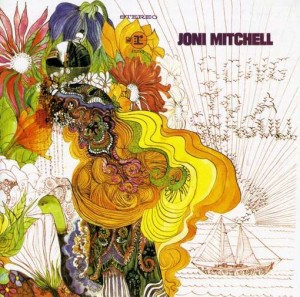 “Song to a Seagull” is one of her more elusive albums. The next two, “Clouds” and “Ladies of the Canyon” were chock full of memorable songs–’Both Sides Now’, ‘Chelsea Morning’, ‘(He Sang Real Good) For Free’, ‘Woodstock’, ‘Big Yellow Taxi’, ‘The Circle Game’. But this first album had only three songs which reached out to grab even a serious listener, the first three cuts on the album, all energetic, melodic, thematically clear, accessible, even memorable–. But then comes a series of six minor songs in minor keys. Then our SoTW, ‘Cactus Tree’, the last track, hiding behind that six-song string of bummers.
“Song to a Seagull” is one of her more elusive albums. The next two, “Clouds” and “Ladies of the Canyon” were chock full of memorable songs–’Both Sides Now’, ‘Chelsea Morning’, ‘(He Sang Real Good) For Free’, ‘Woodstock’, ‘Big Yellow Taxi’, ‘The Circle Game’. But this first album had only three songs which reached out to grab even a serious listener, the first three cuts on the album, all energetic, melodic, thematically clear, accessible, even memorable–. But then comes a series of six minor songs in minor keys. Then our SoTW, ‘Cactus Tree’, the last track, hiding behind that six-song string of bummers.
Live on the BBC, 1970: ‘For Free’, ‘My Old Man’, ‘Chelsea Morning’, ‘Big Yellow Taxi‘, ‘Cactus Tree’:
The album is a series of thematically connected vignettes. The liner notes indicated that the 10 songs were divided into two cycles, “I Came to the City” and “Out of the City and Down to the Seaside”. The auteur speaks in a clear, distinct voice throughout, spinning her tapestry of events and relationships in the cusp of freedom; her home, her child, her marriage, even her struggle for recognition all left behind. Now she’s in New York, she’s getting acclaim, she’s having relationships. Even the weak songs combine to give a rich picture of this life. ‘Marcie‘ a solitary, anonymous young woman, lost in the city (covered by Chris Thile/Brad Mehldau). ‘Nathan La Franeer’, her encounter with a rapacious cabbie. ‘Sisotowbell Lane‘, an idyll of domestic bliss, replete with rocking chairs and curtains. ‘Dawntreader‘, which sinks in the obscurity of “peridots and periwinkle blue medallions”. ‘The Pirate Of Penance’, a seafaring allegory. ‘Song to a Seagull‘, strong lyrically, but underdeveloped melodically.
Joni Mitchell’s Website, videos by decade
Mama Cass, Mary Travers & Joni Mitchell – I Shall Be Released
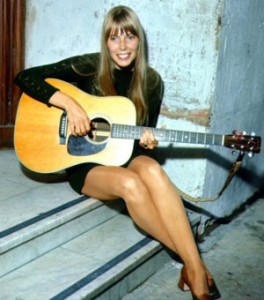 But before them we have the three gems that open the album. ‘I Had a King’, a declaration of independence from her ex-husband, moving on with determination, without regrets or recriminations (“There’s no one to blame/No there’s no one to name as a traitor here”). It’s immediately followed by ‘Michael from Mountains’ an exhilarating paean to new-found love, a beautiful, weaving melody, a stunning performance, a moving song. And then the best song on the album, ‘Night in the City’. It’s the only really produced song on the album, Joni on guitars, Joni on tinkly piano (the only cut to use a keyboard), a great vocal canon, Stills’ knockout bass, giving an impetus to the mix that renders drums unnecessary.
But before them we have the three gems that open the album. ‘I Had a King’, a declaration of independence from her ex-husband, moving on with determination, without regrets or recriminations (“There’s no one to blame/No there’s no one to name as a traitor here”). It’s immediately followed by ‘Michael from Mountains’ an exhilarating paean to new-found love, a beautiful, weaving melody, a stunning performance, a moving song. And then the best song on the album, ‘Night in the City’. It’s the only really produced song on the album, Joni on guitars, Joni on tinkly piano (the only cut to use a keyboard), a great vocal canon, Stills’ knockout bass, giving an impetus to the mix that renders drums unnecessary.
Most of the little I understand of the female psyche I’ve learned from Joni Mitchell. I don’t take her to be emblematic of Womanhood. She’s an individual, with a unique vision of the world, but one that is profoundly female. She has thoughts and feelings and desires and disinclinations that seem to me engendered in that other side of the fence, visions and versions that would never cross my testeronic landscape.
‘Cactus Tree’
 ‘Cactus Tree’ is a catalogue of her ex-lovers. She’s new to the city, untethered and unbridled, liberated, exploiting to the fullest the sexual freedom just becoming available to the fairer sex circa the spring of 1968. The imagery is seaside hippie throughout, the schooners and the beads and the flowers and the harbors. And her endless list of lovers, flaunting her freedom/promiscuity.
‘Cactus Tree’ is a catalogue of her ex-lovers. She’s new to the city, untethered and unbridled, liberated, exploiting to the fullest the sexual freedom just becoming available to the fairer sex circa the spring of 1968. The imagery is seaside hippie throughout, the schooners and the beads and the flowers and the harbors. And her endless list of lovers, flaunting her freedom/promiscuity.
The first three verses talk about one man each, a sailor and a mountain man and a businessman, him wanting her, her valuing her freedom too much to commit. Remarkably, she presents the view of the relationship through the men’s eyes, not through her own. It’s such a personal, intimate song—yet she chooses to spend most of it looking through the male eyes, perhaps to define her ‘self’ via her lovers.
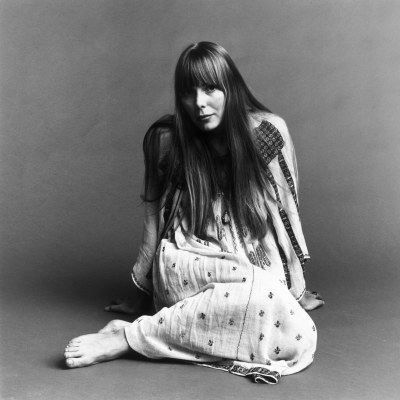 At the beginning of the fourth verse, our narrator appears casually, almost obscured in the crowd of her lovers – “There’s a lady in the city and she thinks she loves them all.” ‘Love’, Joni? She has a genuine affection towards each and every one, albeit transient. But we’re talking about a girl who knows how to have a good time. Every night, a new good time.
At the beginning of the fourth verse, our narrator appears casually, almost obscured in the crowd of her lovers – “There’s a lady in the city and she thinks she loves them all.” ‘Love’, Joni? She has a genuine affection towards each and every one, albeit transient. But we’re talking about a girl who knows how to have a good time. Every night, a new good time.
“She has brought them to her senses” – not ‘brought them to their senses’, because she’s done the opposite, she’s confused them. How has she done that? With her womanly passion, by making love to them, by taking them to her sensual place, the place of her senses. “They have laughed inside her laughter”, profoundly intimate, but not too serious. “She rallies her defenses”–you can come inside me, you can laugh with me inside me, but only for a little while. Then you have to go, because I have to go. “For she fears that one will ask her for eternity–and she’s so busy being free.”
“She will love them when she sees them,” each and every one on his own terms. For the time that she sees him. Till she moves on. And if they try to hold her, they lose her. Don’t forget, this was March, 1968—the very dawn of the sexual revolution. Prior to this, women did not have sex outside marriage. Certainly not with innumerable partners. Or at least they didn’t talk about it.
 And then that evocative line, ‘you know there may be more’. On the recorded version, there’s catch in her voice–second thoughts? Regrets? Confession? It’s certainly not ‘matter-of-factual’. She has doubts about her butterflyness? The vestiges of her mother’s moral system? Self-criticism that this is her limited and limiting modus operandi?
And then that evocative line, ‘you know there may be more’. On the recorded version, there’s catch in her voice–second thoughts? Regrets? Confession? It’s certainly not ‘matter-of-factual’. She has doubts about her butterflyness? The vestiges of her mother’s moral system? Self-criticism that this is her limited and limiting modus operandi?
“She only means to please them”. That’s the key line for me. A man’s ultimate goal is to achieve pleasure. A woman’s ultimate goal is to give pleasure. It’s hardwired into our brains and our psyches and our genitalia. But “Her heart is full and hollow like a cactus tree”. Who knows if a cactus tree really is full and hollow? Go ask a botanist, but who cares? Joni knows, and that’s all that matters.
Two years later, in this stunning performance on the BBC, there is no catch in her voice. But the melody is so melancholy. So what’s the point? My gut tells me that she’s undercutting the validity of the narrator’s point of view, that we aren’t meant to buy into it without reservation, that there’s an implicit self-criticism, the speaker towards her life, Joni toward her song, the listener towards the work of art. That she’s too busy being free. Joni’s a consummate enough artist to work on that level of complexity. But that’s certainly arguable here. Indeed, 54 years later, I continue to debate it with myself.
And this is just the first album. “And you know there may be more.” Well, there were, another seven or so masterpieces. And her relationships deepened, and she got her very large heart broken. Over and over. And in her magnanimous femininity, she invites us in to partake of it all. She brings us to her senses. Thanks, Joni.
For Extra Credit
If you enjoyed this post, you may also like:
259: Chris Thile & Brad Mehldau: ‘Marcie’ (Joni Mitchell), ‘Don’t Think Twice’ (Dylan)
141: Joni Mitchell, ‘I Don’t Know Where I Stand’
163: Joni Mitchell, ‘For Free’
286: Joni Mitchell, ‘The Circle Game’
177: Joni Mitchell, ‘Woodstock’
014: Woodstock, the event (Hebrew); Joni Mitchell, ‘Woodstock’ (in English)
277: Joni Mitchell, ‘Electricity’
260: David Crosby/Joni Mitchell, ‘Yvette in English’Cactus Tree
There’s a man who’s been out sailing
In a decade full of dreams
And he takes her to a schooner
And he treats her like a queen
Bearing beads fromCalifornia
With their amber stones and green
He has called her from the harbor
He has kissed her with his freedom
He has heard her off to starboard
In the breaking and the breathing
Of the water weeds
While she was busy being free
There’s a man who’s climbed a mountain
And he’s calling out her name
And he hopes her heart can hear
Three thousand miles he calls again
He can think her there beside him
He can miss her just the same
He has missed her in the forest
While he showed her all the flowers
And the branches sang the chorus
As he climbed the scaley towers
Of a forest tree
While she was somewhere being free
There’s a man who’s sent a letter
And he’s waiting for reply
He has asked her of her travels
Since the day they said goodbye
He writes “Wish you were beside me
We can make it if we try”
He has seen her at the office
With her name on all his papers
Thru the sharing of the profits
He will find it hard to shake her
From his memory
And she’s so busy being free
There’s a lady in the city
And she thinks she loves them all
There’s the one who’s thinking of her
There’s the one who sometimes calls
There’s the one who writes her letters
With his facts and figures scrawl
She has brought them to her senses
They have laughed inside her laughter
Now she rallies her defenses
For she fears that one will ask her
For eternity
And she’s so busy being free
There’s a man who sends her medals
He is bleeding from the war
There’s a jouster and a jester
And a man who owns a store
There’s a drummer and a dreamer
And you know there may be more
She will love them when she sees them
They will lose her if they follow
And she only means to please them
And her heart is full and hollow
Like a cactus tree
While she’s so busy being free

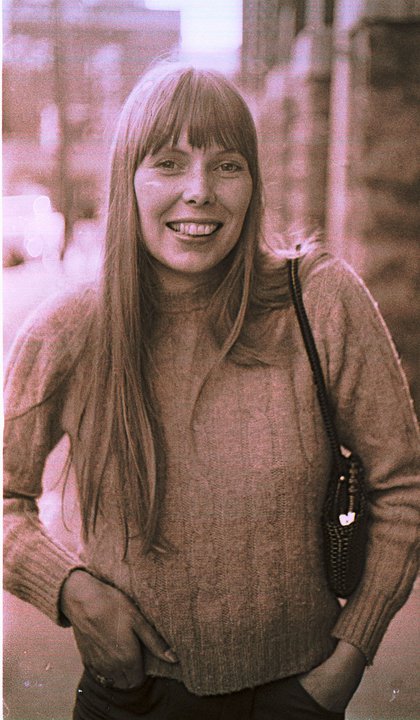
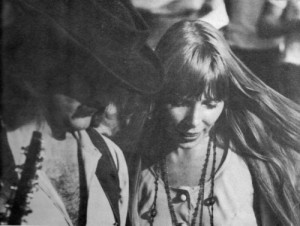
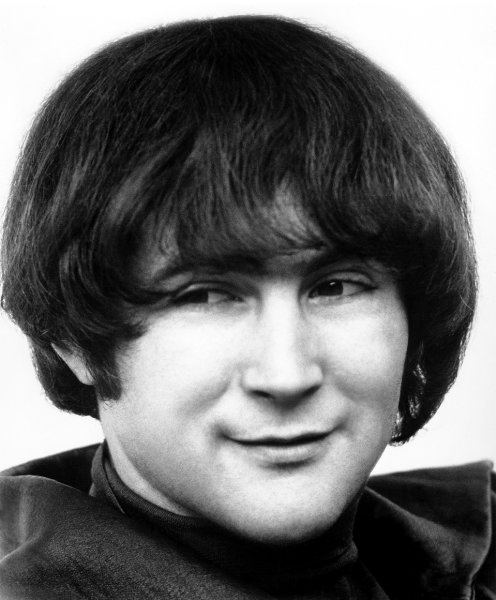
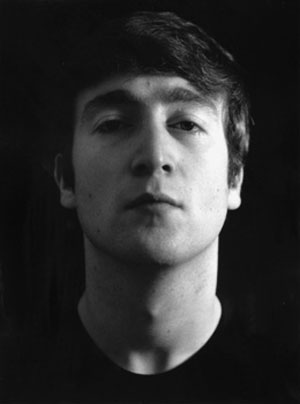
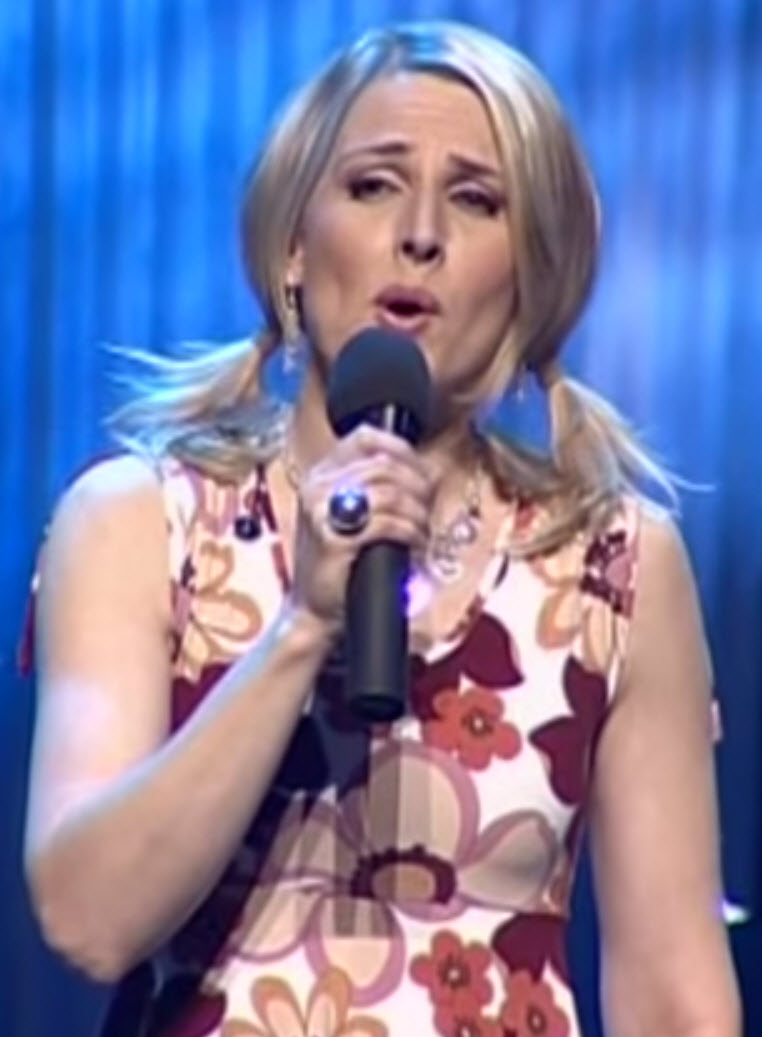
Thank you Jeff. That took me back.
Serious depth to this artist. Another inspired choice.
I sometimes fail to grasp the poetry in songs, maybe because that’s not my mother tongue. When I hear Gilberto Gil sing “Drao”, or Caetano singing “Tigresa”, I understand the poetry, sadness, and the beauty of human interactions, but when I hear Joni Mitchell, somehow my ears blank out the words, and I only hear an acoustic guitar, some nice vocal exercises, and your words flowing by. Maybe I will once sit down and listen to those songs.
I understand your reluctance to hear Kronos. I tried, God knows. There’s another quartet playing rock groups such as nirvana, and I found it terribly disturbing.
Thank you as usual for reminding me it is Shabat, and the beautiful writing and insights into those great artists. Shabat Shalom !
Joni is one of my all time favourites. Your article is first class and really does her justice. 10/10 interesting
@Michael–re Joni, musicality. I admit that this is a relatively obscure and uncharacteristic choice, certainly not what I would recommend someone to base their exposure to Joni on. Ladies of the Canyon is probably her most accessible album; if you’re only going to listen to one once, that’s what I’d recommend. Blue and Court and Spark are the masterpieces. Blue is very textual, C&S less so.
I remember in 1968 I had a French friend, a musician, limited English, who loved Dylan! I never understood that, I admit.
re Kronos–I enjoy some of their stuff very much! I was trying to make fun of myself attempting to listen to their entire catalogue.
Thanks Jeff– excellent column on Joni Mitchell. I am just now getting around to reading “Girls Like Us” so this is very timely for me. Several of her songs carry a lot of meaning for me but I know nothing about her first album. I’ll give it a listen, especially “Cactus Tree!”
Joni is/was indeed one of a kind. just amazing lyrics and an unmatched poignancy in her voice. There was always a tremendous sadness to her early work, as if all her searching for love in the end was never satisfying. I don’t appreciate her transformation into jazz, but that’s my loss, not hers. I wish I could and dearly miss what might have been with more popular albums. She was the best. But like love, jazz was another “Urge For Going” she could not refuse. Maybe her most profoundly sad song, along with “Amelia”. Don’t know if I’m allowed to pass this on, but I very much recommend the American Masters PBS film about Joni’s career.
Just a wee bit of a correction because, as a Canadian, it irks me when people get these things wrong. Saskatoon is in Saskatchewan, not Ontario. I’m going to guess the incorrect spelling of Ontario is a slip of the fingers, because I often type it that way too, when I’m in a hurry.
Apart from that, I enjoyed the story, so thanks!
I’m gonna make you my editor. Thanks.
I consider Joni a hero of her time. Her unique and changing styles taught me, as a teen ager to be independent, that It’s ok for a good girl to have an opinion of her own, and that leadership of ones own life can be lonely but also adventurous and fun. And she started me singing. I loved your post because in a way, it touches on many of these aspects and more. Thanks!
@Dana. Yow. Thanks.
Hi Jeff, ThankU for the fine write-up on Joni’s world and ‘Cactus Tree’. I still am thrilled and sweetly chilled by Joni’s octave range and how deeply she reaches my core. ‘River’ is almost as soulful. Talent and heart, for sure. Warmly, Pablo
I have just discovered this album and this song speaks to me most. Thank you for sharing your thoughts on it.
I’m embarrassed to say that I just stumbled across this song at 32 years of age. It’s my first real awareness of a Joni Mitchell song, which is even worse. I paid attention to the lyrics after being enchanted by the melody after around ten listens. Now that I’ve studied the lyrics and found your wonderful commentary, I appreciate it all the more.
I also stumbled on this gem late in my exposure to Joni. It’s brilliant. I also got something else out of the lyrics, meaning that potentially freedom also becomes limiting in that it prevents you from connecting with someone who may actually be worth knowing and in so doing it prevents you from building a life and expanding, despite the fact that you are free. So she is anonymous in the city, these lovers are just numbers, and she is free but yet disconnected and too busy to recognize an opportunity for love and connection. Maybe it is a sad interpretatIon, but liberation has its own chains, does it not? Just another perspective… This is how you know it is a great song – it can take on so many different meanings.
‘Freedom”s just another word for ‘nothing left to lose.’
Yeah, for sure.
I have always liked Judy Collins’ Both Sides Now and Tom Rush’s Urge For Going a lot. This song, Cactus Tree, is, I suppose, a bit too subtle for me. I’d never heard it before and it sounds fairly bland. Maybe if you have gone through all of her more melodic songs and you just like her sound, you can see the value in this one.
I’m a big Joni fan but hadn’t listened to Song to a Seagull since uh, when were CDs invented? Thanks for reminding me just how great she was from day one.
Thx Jeff for the thoughtful analysis of one of Joni’s better songs, but she has had many. First turned on to her via girl friend in HS and then another in college giving me my first Joni album, Blue, an album that in some ways reminds me of Willie Nelson’s Red Headed Stranger – each beautiful, mournful with rich lyrical storytelling. And as Joni moved into jazz, I was doing so as well and appreciated her willingness to stretch. Today, one of my fav albums remains Hissing of Summer Lawns. There is no better poetic description of the emptiness of much of what our modern society has created. Can’t imagine if she were still writing today how she might address/express the hollowness of social media, the rise of Trump, etc. Strange times
Jeff,
This song is exquisite and I hear something new every time I come back to it. Joni taught me to listen carefully, to hear the tunings and the words apart and in concert. Maybe because I listened to it so often when I was very young, but for me, this entire album is a joyful experience. A perfect contemplative meditation. Thank you for sharing your thoughts on what it feels like to listen to Joni’s music. All the best, June
Your review/essay came off as someone who moves into an apartment & finds a photo album of someone’s precious memories mistakenly left behind. Each picture has a long story, every face has a life. But you flip through with a sneer, “Well these are stupid, meaningless, blurry, silly pics. Oh, here’s a nice one, but I don’t know what all that crap is in the background. Why would anyone want to keep these?”
Haha, I’ve never read a snarky review of Joni Mitchell’s music. Now I have. Like watching someone dissecting a long dead half frozen frog instead of a retrospective look at a classy musician’s early work and one of her finest songs.
I was pleased by my comment from 2017. It was my original reaction again but I listened to Cactus Tree right through this time paying attention to the lyrics and I liked it a bit better. Maybe next time around, who knows.
Mick Wolfe, you nailed it. A much more nuanced and insightful take on Cactus Tree is here nyfos. org/joni-mitchell-cactus-tree/
I’m speechless. Thank you for the brilliant and thoughtful analysis of Joni Mitchell.